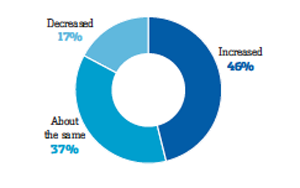
ANNUAL SPEND ON EVENTS
The annual average spend on events peaked at £792,367 per event during 2008. However, this was just before the recession and the industry was arguably the hardest hit of the marcomms sectors, with spend dropping considerably. Yet despite not quite matching the level of 2006, event spend is definitely starting to increase, which can only be good news for 2012.
HOW HAS YOUR WORKFORCE CHANGED?
It is very positive that almost half of the respondees have revealed their companies are expanding their workforces. ESP recruitment managing director Liz Sinclair explains: "We have certainly found it to be very busy over the past 12 months, and whereas 2010 was very much an employer's market, it is becoming more a candidate's market in certain sectors, where there are a lot of new jobs."
SALARY INCREASES
Interestingly, 49 per cent of the industry saw a rise in salary in the past 12 months, which has halted a four-year decline in the proportion receiving said increases. The actual average salary increase per person was four per cent, which is above the national average of 1.8 per cent during the same period. This in itself is great news and sets the sector up brilliantly for 2012.
BENEFITS
Bonus and profit share is the most important benefit for those in the industry and this has increased by four per cent in the past 12 months, while commission has risen year on year for the past five years. Sinclair comments: "The event industry isn't the best paid in the UK, but people clearly feel they need some kind of monetary recognition for doing a good job."
The other notable increase was in flexible working hours, with a five per cent increase year on year. This can be explained by the unsociable and long hours that tends to be the norm for event organisers.
PROSPECTS
Despite prospects seemingly improving, and a lower risk of redundancy, the survey has revealed that 43 per cent were intending to move jobs within the next year, and 62 per cent within the next two years.
MAIN REASON FOR LEAVING YOUR LAST JOB?
Sadly, a lack of career prospects is almost always the top answer when it comes to reasons for moving jobs.
"There are a lot of smaller companies in this industry, which can lead to a glass ceiling for the candidate's prospects," says Sinclair. "People often assume that working for a larger blue-chip organisation will guarantee personal development, but often the events or comms team within a company are quite small, and promotion may mean a move out of events or to another company."
WHICH SOCIAL-NETWORKING SITES DO YOU USE FOR WORK?
In the past 12 months social networking has started to play a significant role in the success of events. For minimal costs, an organiser can sustain the life of their event way beyond the one or two days of the live environment. It is probably no surprise that LinkedIn is the most popular site, followed by Twitter and Facebook.
MOTIVATION BY SECTOR?
It is interesting that production companies make up one of the few sectors of the industry that claims money is not the number-one motivating factor, despite the fact that it is one of the better-paid areas to work in.
Sinclair says: "This is one of the most creative sectors of the industry, which meant creativity was high on the agenda for them in terms of motivation. This hopefully demostrates that they are passionate about what they do."
MOST EFFECTIVE WAY TO FIND A JOB?
Recruitment consultants are still the number-one way to find a job in the event industry. "I think this is ultimately because people like the personal touch, to be able to speak to someone about their career and gain advice on their CV," says Sinclair. However, the results show that 'word of mouth' is increasing, while online job boards have entered the fray and gone from zero to 17 per cent in just 12 months - an amazing increase.

